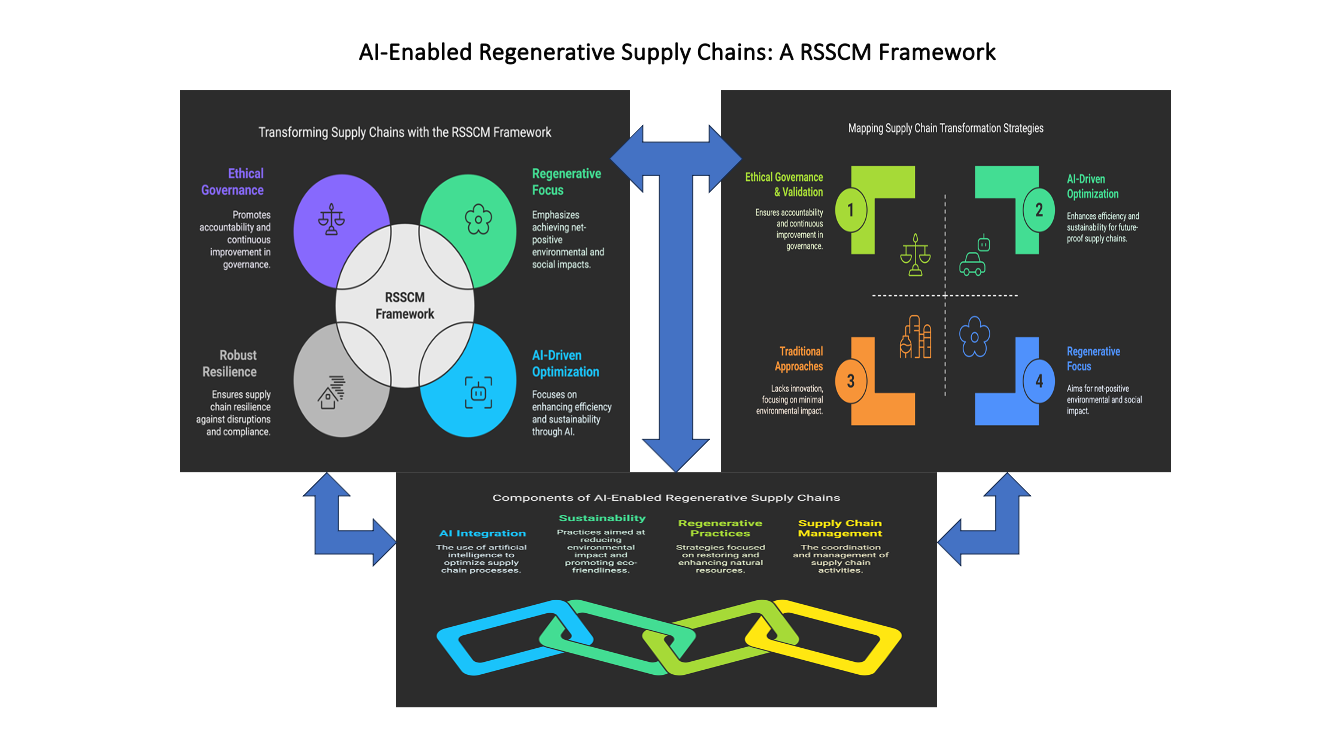
AI-Enabled Regenerative Supply Chains: A RSSCM Framework
Title
AI-Enabled Regenerative Supply Chains: A RSSCM Framework
Author
1. Henry Onomakpo Onomakpo, Student, Universitas Gadjah Mada, Indonesia
Abstract
Addressing a critical gap in sustainable supply chain management (SCM), this study develops and proposes the comprehensive Regenerative Sustainable Supply Chain Management (RSSCM) framework. Synthesized from a systematic literature review and bibliometric analysis of contemporary research, the study identified the essential need to integrate AI-driven optimization, robust resilience strategies, circular economy principles, and ethical governance to achieve actively regenerative outcomes. The resulting RSSCM framework structures these critical components into Optimization, Resilience, and Regeneration pillars, all underpinned by a foundational Governance and Validation layer. This integrated model advocates for strategic digital technology application (AI, IoT) to drive efficiency, resilience, and sustainability, promoting a necessary paradigm shift towards supply chains generating net positive environmental and social impacts. The research provides practitioners with a structured roadmap for transformative change and offers academics a theoretically grounded framework for future inquiry, ultimately advancing progress towards more sustainable and equitable global supply networks.
Keywords
Conclusion
This study addressed a significant gap in sustainable supply chain management by developing the comprehensive Regenerative Sustainable Supply Chain Management (RSSCM) framework, derived from a systematic literature review and bibliometric analysis. The principal contribution is the RSSCM framework itself, a novel, theoretically grounded model integrating Optimization, Resilience, and Regeneration pillars, all supported by a crucial Governance and Validation foundation. This framework directly answers the research questions by defining the essential components and principles for regenerative supply chains applicable across industries (RQ1) and outlining a structured approach for their implementation and impact measurement (RQ2).
The core finding of this research is that progressing beyond incremental sustainability requires a fundamental shift towards the synergistic integration offered by the RSSCM framework, explicitly aiming for net positive environmental and social impacts. The analysis confirmed the critical role of digital technologies, especially Artificial Intelligence (AI) and the Internet of Things (IoT), as indispensable enablers for achieving the necessary efficiency, resilience, transparency, and regenerative capabilities.
The RSSCM framework holds significant implications. For academic researchers, it provides a structured agenda for future empirical investigation, particularly focusing on validating the framework's elements and developing robust Key Performance Indicators (KPIs) tailored to regenerative outcomes. For industry practitioners, it offers a practical roadmap for implementing regenerative principles, moving beyond conventional sustainability to build supply chains that are economically viable, environmentally restorative, and socially equitable.
The primary limitations of this study include its foundation in existing literature, necessitating empirical validation of the proposed RSSCM framework to confirm its real-world effectiveness. Additionally, the current lack of standardized metrics for assessing regenerative impact poses a challenge addressed by this framework's structure but requires further methodological development. Future research, as detailed in the discussion (Section 3.6), should therefore prioritize empirical testing across diverse sectors, the creation of specific regenerative KPIs, longitudinal analysis of framework adoption, and the exploration of advanced technological integration.
In essence, this research asserts that the future of responsible and effective supply chain management lies in embracing a regenerative paradigm. The RSSCM framework provides a concrete structure for organizations to navigate this transition, fostering the development of supply chains that are not merely sustainable and resilient but actively contribute to a thriving planet and society.
Author Contrubution
Henry Efe Onomakpo Onomakpo conceived the study, performed the literature review, conducted the bibliometric analysis, developed the framework, and wrote the manuscript.
Funding
This research did not receive any specific grant from funding agencies in the public, commercial, or not-for-profit sectors.
Conflict of Interest
The author declares that there are no conflicts of interest.
Data Sharing Statement
The bibliometric data analyzed in this study originates from the Scopus, Dimensions, and ScienceDirect databases. Due to the proprietary nature of these databases, direct access to the raw data is subject to individual subscription agreements with the respective database providers. However, the processed data, along with the analytical code used in this study (primarily utilizing the "bibliometrix" package in R, which can be assessed on https://cran.r-project.org/package=bibliometrix), is deposited on the publisher’s website. The materials will remain archived permanently.
Software And Tools Use
R programming language Bibliometrix package biblioshiny() function.
Acknowledgements
The author would like to thank the faculty of Economics and Business staff for their support in the preparation of this manuscript.
Corresponding Author
Copyright
Copyright: ©2026 Corresponding Author. This is an open access article distributed under the terms of the Creative Commons Attribution License , which permits unrestricted use, distribution, and reproduction in any medium, provided the original author and source are credited.
Onomakpo Onomakpo, Henry. “AI-Enabled Regenerative Supply Chains: A RSSCM Framework.” Scientific Research Journal of Business, Management and Accounting, vol. 3, no. 1, 2025, pp. 1-31, https://isrdo.org/journal/SRJBMA/currentissue/ai-enabled-regenerative-supply-chains-a-rsscm-framework
Onomakpo Onomakpo, H. (2025). AI-Enabled Regenerative Supply Chains: A RSSCM Framework. Scientific Research Journal of Business, Management and Accounting, 3(1), 1-31. https://isrdo.org/journal/SRJBMA/currentissue/ai-enabled-regenerative-supply-chains-a-rsscm-framework
Onomakpo Onomakpo Henry, AI-Enabled Regenerative Supply Chains: A RSSCM Framework, Scientific Research Journal of Business, Management and Accounting 3, no. 1(2025): 1-31, https://isrdo.org/journal/SRJBMA/currentissue/ai-enabled-regenerative-supply-chains-a-rsscm-framework
9705
Total words3162
Unique Words461
Sentence19.494577006508
Avg Sentence Length0.19177792750926
Subjectivity0.024001334374746
PolarityText Statistics
Viewed / Downloads
Total article views: 232 (including HTML, PDF, and XML)| HTML | XML | Total | |
|---|---|---|---|
| 124 | 65 | 43 | 232 |
Viewed (geographical distribution)
Thereof 232 with geography defined and 0 with unknown origin.
